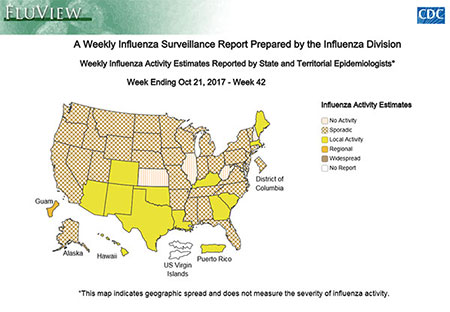First flu-related death of season reported in Iowa

Influenza activity in Iowa and throughout the United States has been low so far this season. For the week of Oct. 15-21, the State Hygienic Laboratory confirmed three influenza A(H3) viruses from submitted samples with two additional influenza A positive specimens awaiting subtyping.
Five influenza-related hospitalizations were reported from sentinel hospitals during this week. During this same time period, reported illnesses included 14 adenovirus, 47 parainfluenza virus type 1, four parainfluenza virus type 3, one parainfluenza virus type 4, 86 rhinovirus/ enterovirus, one RSV, and two coronavirus.
The State Hygienic Laboratory is the primary lab for influenza testing and reporting in Iowa. SHL reports the number of tests performed, and the type and sub-type of positive tests to the influenza surveillance network several times every week. The laboratory also surveys clinical and reference labs on a weekly basis for the number of rapid-antigen tests performed, and the number of positive and positive non-influenza virus tests. This report also includes the positive non-influenza virus tests reported from the Dunes Medical Laboratories at Mercy Medical Center in Sioux City.
The CDC recommends that essentially everyone over 6 months of age should receive the flu vaccine, preferably before the holiday season begins. It takes up to two weeks after vaccination for the body to achieve full benefit against the flu virus.
The flu is a respiratory illness caused by viruses. The flu comes on suddenly, and symptoms may include fever, headache, tiredness, cough, sore throat, nasal congestion and body aches. The illness typically lasts two to seven days, and often puts healthy people in bed for days. A “stomach bug” that causes diarrhea and vomiting is not caused by the influenza virus, but usually by norovirus. The flu vaccine does not provide protection against this illness.
Details about the number of flu, respiratory and respiratory syncytial virus cases in Iowa are available in the IDPH Weekly Iowa Flu Reports.



